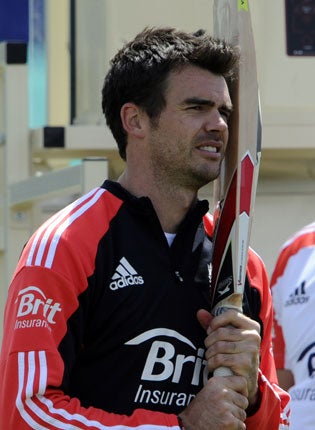Anderson returns to bolster England's attack for third Test

To widespread relief, Jimmy Anderson was recalled by England yesterday for the third Test. If it is a blessing that his side strain, a pesky occupational hazard for fast bowlers which can threaten entire careers, has recovered so quickly, it is also extremely welcome for a team which struggled to make an impact without him in the second Test.
Anderson's stock rose with every errant leg-side ball bowled by the seam trio at Lord's and the 32 byes conceded by wicketkeeper Matt Prior betray the fact that there were far too many. Whether Anderson would have overcome a benign pitch sufficiently to ensure that England took 20 Sri Lankan wickets is doubtful but his place as the leader of the attack was only enhanced.
Geoff Miller, the chairman of selectors said: "Side strains can be particularly troublesome for bowlers but given Jimmy's injury was a grade one strain and therefore a low-grade injury, he is expected to be fit for selection. A period of rest and recovery has certainly been beneficial and we obviously wouldn't include Jimmy in the squad if the medical staff weren't confident of his fitness."
Since England have not always been wholly accurate in their prognoses it is natural to be slightly cautious about Anderson's place in the final XI for the match against Sri Lanka at the Rose Bowl on Thursday. The intention for him to have a fitness test in Lancashire's Twenty20 match against Worcestershire yesterday was prevented by the match's abandonment without a ball bowled, but he has done plenty of work in the nets.
Only the vague doubt about Anderson made it necessary to be mildly inquisitive about the selection. The days have long gone when the chairman's announcement on Sunday morning was compulsory listening, just to see which poor sap had to make way for the latest flavour of the month. It is much more rational now – if too forgiving at times – but it is much less fun.
Assuming Anderson's participation, the composition of the team will be decided by the coach, Andy Flower, and the captain, Andrew Strauss. Steve Finn's four first-innings wickets at Lord's may be insufficient to save him (would five have made the difference?) but in another age Stuart Broad would already have paid for his lack of wickets. Which is not to say they were always right in another age.
The match at the Rose Bowl will be the last Test of the summer in which the Umpire Decision Review System is used. India's refusal to engage with it in the series against England starting next month is embarrassing for the International Cricket Council and for the country's new coach, Duncan Fletcher. It is the ICC's official policy that the UDRS be used in Test matches and the cricket committee's unanimous resolution of two months ago which extended the system to limited-overs matches was, in effect, merely reinforcing its stance.
That recommendation is due to be formally discussed (and presumably ratified on the nod) at the ICC's annual convention in Hong Kong later this month but it is in danger of again looking toothless.
India simply refuse to use the system, largely because senior players including the captain, M S Dhoni, do not like it. The England and Wales Cricket Board, which has changed its view since the days when the chairman, Giles Clarke, described it as that "blasted thing", tried unsuccessfully to persuade the Board of Control for Cricket in India.
The ICC's DRS regulations state: "The DRS will be used in all matches." The Test match regulations are slightly more equivocal, saying: "The home board shall have the right to decide whether or not the DRS is to be used in a home series after consultation and agreement with the visiting board."
England might have been within their rights to tell India that if they were unwilling to use the DRS then the series would not go ahead. The feeling prevailed that the use of the DRS was not the topic about which to have a huge bust-up with the game's most powerful nation.
There may be other battles to fight such as England's inclusion in the Twenty20 Champions League. Either way, India are still calling the shots and there seems nothing the ICC can do.
India's continued resistance is perhaps unexpected since their star batsman, Sachin Tendulkar, was the beneficiary of a review in the World Cup semi-final against Pakistan. The ball from Saeed Ajmal looked for all the world as though it was hitting but Tendulkar, on 23, asked for a review. Somehow, the replays showed it was missing leg and the reprieved batsman went on to make a crucial 85.
It will be entertaining to hear Fletcher's reaction when he arrives with his new team. As the coach of England, he was an animated and persuasive advocate of a limited number of reviews, indeed a pioneer. Presumably, he will try to convince his new charges of its merits.
Join our commenting forum
Join thought-provoking conversations, follow other Independent readers and see their replies
Comments
Bookmark popover
Removed from bookmarks